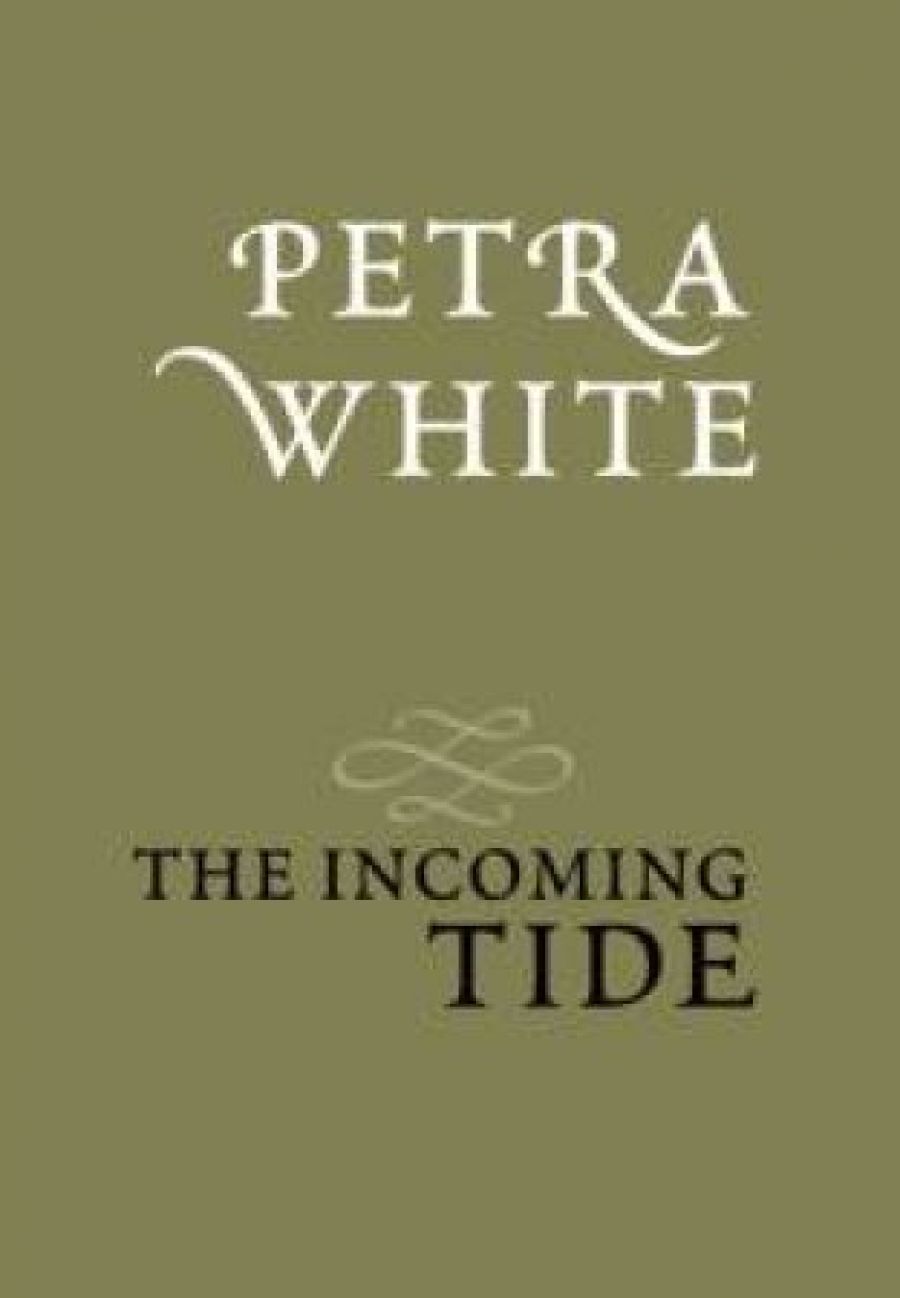
- Free Article: No
- Contents Category: Poetry
- Review Article: Yes
- Article Title: Luminously alone
- Online Only: No
- Custom Highlight Text:
The opening poem in Petra White’s first collection is a modest, tantalising, somewhat mysterious poem called ‘Planting’. A metaphor, you might think, for the inspiration and growth of a poem – much as Seamus Heaney’s famous ‘Digging’, also the first poem in a début collection, established a link via the rhythm of digging, between the act of writing and the act of cultivating land, in a particular place and culture. But this is not so. White’s poem is an aside, takes pleasure in evoking the senses’ responses to a fleeting experience, and coolly resists specific interpretation. Who is it about? Where?
- Alt Tag (Featured Image): Andrew Sant reviews 'The Incoming Tide' by Petra White
- Book 1 Title: The Incoming Tide
- Book 1 Biblio: John Leonard Press, $23.95 pb, 60 pp
- Book 1 Readings Link: booktopia.kh4ffx.net/qnvxNb
Many of the poems in this deeply engaging collection invoke particular places and people, but the connections, unlike Heaney’s, are transient. The most remarkable, ‘Munich’, is an elegy for White’s maternal grandmother, but it is equally about travel, migration and dislocation, inherited uncertainty fuelling the need for connection. It moves from Munich, through which the poet is passing, to England and then to Australia, all the while musing on the deceased English-born grandmother’s life and related matters of psychology, place and history. ‘Here’ turns out to be everywhere. It is an ambitious poem of fragmentary perceptions that shifts from aspects of one place to another, yet they are assembled into a coherent whole via the authority of the voice.
‘Munich’ is a poem of considerable poise, dignity, tenderness and technical accomplishment. At one point in the expansive appreciation of a life and time, viewed from a distance, there’s a startling image: ‘The eye, wild as a bomb, explodes on the present …’ It serves to jolt the poem forward, and resonates with the violence of war and its consequences shown or inferred elsewhere in the poem. It is risky but right. The grandmother’s last words and the last words of the poem – ‘It’s not a dream, is it?’ – is a question that everything conveyed in ‘Munich’ demands to be asked.
Places are named in the titles of several other poems. Littorals feature strongly. Two sequences, ‘Highway’ and ‘Southbank’ – the former set in desert country, the latter in office-land – make up almost half the book. As in much Australian poetry, place is significant for White, though perhaps far more than for most she has a deeply unsettled sense of it; her responses exist wide of any Heideggarian sense of authentic dwelling. Her Munich ‘isn’t whole’, and perhaps ‘Planting’, fraught with uncertainty, is a pointer to tendencies in other poems.
The dozen poems in ‘Southbank’ weave through office areas where to work is to ‘serve an abstract’ that creates amnesia in its workers, stationed ‘in a prison of light’. These are brief, edgy poems in which technology rules, albeit subject to imminent disruption. White makes sport of the jargon and clichés of office-speak. It is an unreal place for a Bosnian cleaner, ‘cheerful as Sisyphus’:
She scales her never-done job, a moonwalker
tracking her cargo through the semi-mirrored
obsidian tangle of offices, herself glowing back at her.
You ride up with her, pin-prick halogen lights,
mirrored wall you vanish into, she polishes.
‘Highway’, a suite of poems that ‘think back into a hippie journey at twenty’ (so the blurb says) – hence, presumably, the punning title – exist at as far of an antipodean remove from ‘Southbank’ as it is possible to get in this book of restlessly changing bearings and perspectives. Here, the artificiality of the office world is replaced by the desert’s elemental forces, where humans ‘may or may not return’, and where, in a marvellous image, an asteroid’s ‘Tiny black tektites, / like the dung of space, are mixed in the spinifex’. In these poems, where the bearings provided by tradition or familiarity do not exist, White brings an utterly fresh eye to poetry about place.
White’s perceptions are frequently arresting. In one section in ‘Southbank’, a girl ‘dwarfs herself / with long words’, while in another, two paramedics in a café ‘dangle from the emergency that hasn’t / yet happened’. In the fine poem ‘Sister’, a pet axolotyl is seen as a rare creature of both scientific and mythological interest, which ‘guards our dangerous / childhood pledge never to change’. It is as much a captive in its tank as of its owner’s now adult perceptions.
The poems are often sharpened by loss of one kind or another. An elegy for her paternal grandmother voyages through generations and places. In ‘Rickett’s Point’, observations shift cinematically and it is the postponed threat to a girl’s innocence and trust that intensifies the evocation of her being ‘luminously alone’ at the beach. The focus in a couple of the poems, ‘Grave’ and ‘A Likeness’, is not as successful. They are too odd-angled and personal to fully engage this reader.
This is a collection whose strengths are in far greater evidence than any weaknesses. Like Elizabeth Bishop, seemingly one of White’s influences, she is a poet drawn to the seaboard and with a taste for the surreal. The poems are agile, resourceful, well crafted and rhythmically varied. ‘Ideas of Order at Point Lonsdale’, in which ‘the young moon goes spritzing off / to haunt another planet’, is mesmeric. Surprises and pleasures abound. It is not attention-seeking poetry that endeavours to collar the reader; rather, it elicits attention via its radiant intelligence and unpredictable wit. With The Incoming Tide, Petra White’s poetry has impressively arrived.


Comments powered by CComment